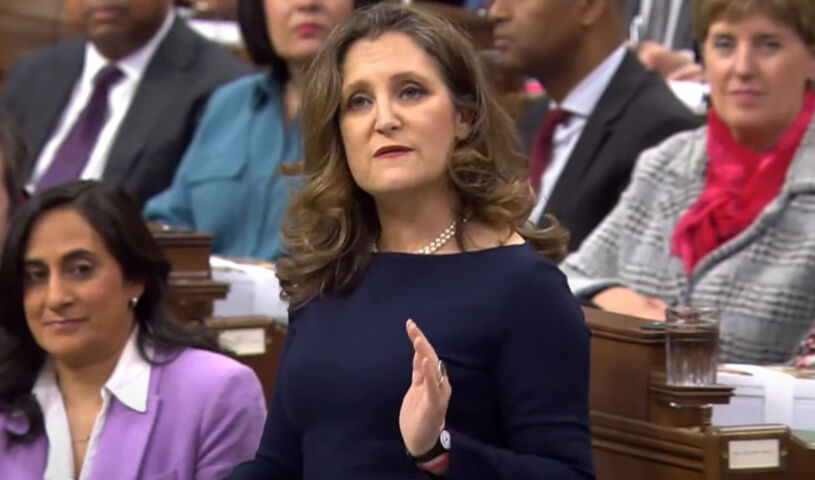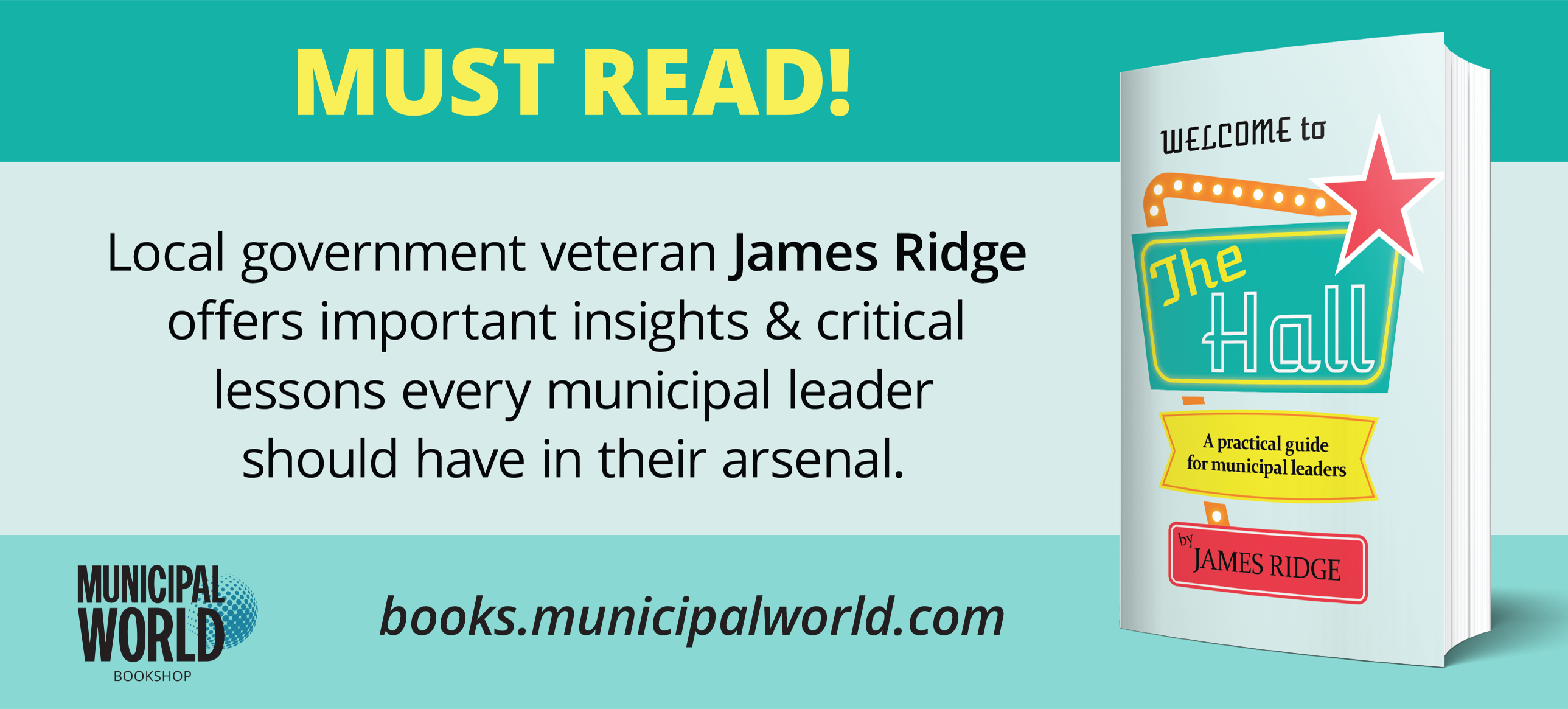Reactions vary to Budget 2024 announcement
 Deputy Prime Minister and Minister of Finance Chrystia Freeland focused on housing and affordability in the federal government’s release of Budget 2024: Fairness for every generation. Photo: Liberal Video YouTube
Deputy Prime Minister and Minister of Finance Chrystia Freeland focused on housing and affordability in the federal government’s release of Budget 2024: Fairness for every generation. Photo: Liberal Video YouTube
The federal government focused on housing and affordability in its release of Budget 2024: Fairness for every generation. These focal points drew a good deal of support from those in – and adjacent to – the municipal sector. But not everyone was completely thrilled by what the Trudeau government put forward.
In her remarks to Parliament, Deputy Prime Minister and Minister of Finance Chrystia Freeland focused attention on Millennials and Gen Z. The government, Freeland said, is promising greater fairness for younger generations by making education, housing, and the everyday costs of living more affordable.
Freeland said the Trudeau Liberals came into office “with a vow” to strengthen and expand the middle class. She also said the government has lived up to that pledge by reducing poverty, especially for children and seniors, while creating millions of jobs. But, she acknowledged, the work isn’t done.
“Budget 2024 renews our focus on unlocking the door to the middle class for millions of younger Canadians,” Freeland said. “We’ll build more housing and help make life cost less. We will drive our economy toward growth that lifts everyone up. That is fairness for every generation.”
Freeland’s budget showcases $535 billion in total government spending for the 2024-25 fiscal year. This includes a total deficit of $39.8 billion.
Housing highlights:
- Building more rental apartments, faster, with an additional $15 billion in new loan funding for the Apartment Construction Loan Program, bringing the program’s total to over 131,000 new homes supported by 2031-32.
- Providing a $400 million top-up to the $4 billion Housing Accelerator Fund, which is already fast-tracking the construction of over 750,000 new homes over the next decade thanks to 179 agreements with municipalities, provinces, and territories.
- Launching a new $1.5 billion Canada Rental Protection Fund, providing $1 billion for the Affordable Housing Fund, and investing an additional $1.3 billion for Reaching Home: Canada’s Homelessness Strategy.
- Accelerating the construction and upgrading of housing-enabling infrastructure by providing $6 billion over 10 years through a new Canada Housing Infrastructure Fund.
Affordability highlights:
- Investing in helping to build more childcare spaces to grow the Canada-wide early learning and child-care system and deliver $10-a-day childcare.
- Launching a new Canada Disability Benefit to supplement provincial and territorial benefits to increase the financial well-being of over 600,000 working-age persons with disabilities.
- Creating a new National School Food Program to expand existing provincial and territorial school food programs and taking the first steps toward launching a national pharmacare program.
- Continuing to help bring down the cost of groceries by implementing measures to strengthen competition in the grocery sector, monitor grocers’ work to help stabilize prices, and tackle shrinkflation to uphold the food sizes and qualities Canadians expect.
Economic growth highlights:
- Investing $2 billion to launch a new AI Compute Access Fund and Canadian Sovereign Compute Strategy.
- Temporarily allowing businesses to immediately write off the full cost of investments in patents, data network infrastructure equipment, computers, and other data processing equipment.
- Boosting support for student and postgraduate researchers, including Indigenous researchers and their communities, through increases to core research grant funding and scholarships and fellowships.
- Increasing access for the next generation of First Nations university, college, and post-secondary students with an investment of $242.7 million over three years.
The budget projects $21.9 billion in new revenue. A big part of that is a new capital gains tax. Ottawa is raising the inclusion rate to two-thirds on annual capital gains above $250,000 for individuals. The measure is expected to net $19.4 billion over five years.
National Municipal Perspective
The Federation of Canadian Municipalities (FCM) welcomed the budget’s focus on solving the housing and homelessness crises, including through investments in housing enabling infrastructure.
The budget’s new investments – such as the $1 billion for community infrastructure – signal the federal government is responding to FCM’s ongoing advocacy. It is also an acknowledgement that municipalities cannot address the housing crisis without investing in local infrastructure.
“FCM has been clear that for every new home built, there must be a corresponding investment in infrastructure. Ottawa has heard us on this front,” said FCM President Scott Pearce. “We will work in collaboration with the federal government to discuss the details of the funding and how we can deliver these important immediate investments to Canadians in parallel with fixing our funding model for the long term.”
FCM remains committed to engaging all orders of government to advocate for a commitment to negotiate a new Municipal Growth Framework. FCM officials have long maintained that municipalities own and maintain most of the infrastructure that Canadians rely on every day. This includes everything from local roads to water systems to mental health services. Yet, the current funding model for municipalities hasn’t evolved since 1867.
“It is imperative to adopt a modernized funding model to maintain and enhance the vital services and infrastructure that municipalities provide, ensuring the stability and quality of life that Canadians rely on,” Pearce said.
Big City Mayors Weigh In
Halifax Mayor Mike Savage is also chair of FCM’s Big City Mayors’ Caucus. Savage said the country’s largest cities are undergoing “tremendous growth” and local government officials are excited about the future. The investments in Budget 2024, Savage said, will help narrow an immediate funding gap in the municipal infrastructure required to improve the quality of life in communities.
“Municipalities are hubs for critical services and infrastructure: receiving eight to 12 cents for every tax dollar just isn’t cutting it, “Savage said. “We need new funding tools so that we can continue supporting necessary growth.”
Savage also noted the budget lacked more investments in the Disaster Mitigation and Adaptation Fund, which helps municipalities impacted by the rising effects of climate changes.
As with their counterparts nationwide, the mayors of Ontario’s largest cities also weighed in on the 2024 budget. Ontario’s Big City Mayors (OBCM) – which includes mayors of 29 single and lower-tier cities with a population of 100,000 or more – welcomed Freeland’s investments. But OBCM was quick to add more can be done to support Canada’s municipalities in responding to the housing.
“We applaud the federal government for their commitment in today’s budget to invest billions of dollars to get more homes built across Canada,” said Burlington mayor and OBCM chair Marianne Meed Ward. “When we work together, we can do great things and build safe, affordable and thriving communities for years to come.”
Canadian Chamber Opinions Mixed
Policy experts from the Canadian Chamber of Commerce offered their own perspectives on the budget.
Perrin Beatty is the chamber’s president and CEO. He said the budget contained “few surprises” and focused on new spending over reduction of the federal deficit. Beatty also said Freeland was missing out on “a clear plan” to promote productivity and restore economic growth.
“Our lagging productivity and stalled GDP growth means Canadians are becoming collectively poorer and working harder to just remain where they are today,” Beatty said. “Among the positive announcements in today’s budget, we’re happy to see a focus on streamlining internal trade. Strengthening our internal trade could elevate GDP growth by up to eight per cent and fortify Canada’s economic foundation.”
Pascal Chan is the chamber’s senior director, transportation, infrastructure and construction. Chan was more effusive in his praise, saying the budget was a move “in the right direction on a long road to housing affordability.”
The Canada Housing Infrastructure Fund, Pascal said, addresses a critical and often overlooked need in the creation of new housing. Pascal also said it is encouraging to see funds earmarked for bringing in labour the homebuilding sector, as well as to develop skilled trades domestically. But even so, he noted that more needs to happen.
“Restoring affordability will require government to pull every tool out of the toolbox to boost supply,” Pascal said. “While funding helps, enabling the private sector to allocate capital to new projects is critical.” MW
✯ Municipal World Executive and Essentials Plus Members: You might also be interested in Sean Meyer’s article: National strategy invests in municipal resiliency.
Sean Meyer is digital content editor for Municipal World.
Related resource materials:



